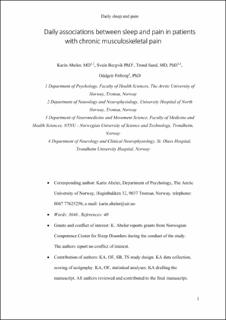Daily associations between sleep and pain in patients with chronic musculoskeletal pain
Peer reviewed, Journal article
Accepted version

Åpne
Permanent lenke
https://hdl.handle.net/11250/2736051Utgivelsesdato
2021Metadata
Vis full innførselSamlinger
Originalversjon
https://doi.org/10.1111/jsr.13237Sammendrag
Patients with chronic pain commonly report sleep problems, and the evidence for a relationship between sleep disturbance and pain seems robust. The day‐to‐day associations between these constructs are less well studied, particularly with objective sleep measures such as actigraphy. Moreover, the concurrent presence of negative affective symptoms, as well as seasonality effects at extreme latitudes may complicate it further. Here, we studied 56 patients with chronic primary musculoskeletal pain conditions, contributing data in two separate 7‐day data‐collection periods during the summer and winter, respectively. The effect of self‐reported sleep quality, and actigraphy measured sleep duration, efficiency and timing on next‐day pain, as well as the effect of pain on the same sleep indices were estimated by generalised linear mixed regression models. The models were additionally adjusted for age, sex, education, data collection period, weekend, season and mental distress, with the latter two also specified as moderators. We observed a significant effect of pain as a predictor of next‐night sleep quality (p = .003) and marginally of next‐night sleep duration (p = .079). Conversely, sleep quality tentatively predicted next‐day pain (p = .063). No other day‐to‐day associations were present. Mental distress was the strongest predictor of pain, but it did not modify the sleep–pain associations, nor did season. In conclusion pain, sleep quality and mental distress are closely related, underscoring the importance of encompassing this complexity in assessment and treatment of patients with chronic pain.